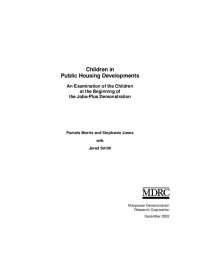Children in Public Housing Developments
An Examination of the Children at the Beginning of the Jobs-Plus Demonstration
This paper begins to fill the information gap by capitalizing on the unique opportunity provided by the Jobs-Plus Community Revitalization Initiative for Public Housing Families, an ambitious research demonstration project that aims to improve residents’ employment status. Using data on nearly 1,500 children of public housing residents collected before the implementation of Jobs-Plus, the paper examines the well-being of children living in public housing developments and explores whether characteristics of their parents and the communities are associated with differences in the children’s outcomes.
Key Findings
- On some, but not all, measures of school and behavioral outcomes, a substantial proportion of children living in public housing exhibited negative outcomes. As expected, older children and boys were at greater risk than younger children and girls.
- When compared with data on other children receiving welfare in selected states, children in the Jobs-Plus developments were shown to be at only slightly greater risk of experiencing negative school and behavioral outcomes.
- Few associations were found between measures of the Jobs-Plus children’s well-being and their parents’ employment or welfare status.
- Parents’ mental health and experience with domestic abuse were associated with negative aspects of children’s schooling and behavior. However, contextual factors of the housing developments, such as the proportion of parents who had jobs, were not related to children’s outcomes.
The data reported here provide a first look at the children in the Jobs-Plus demonstration communities. Further examination of the effects of the Jobs-Plus demonstration on child and adolescent development is planned as part of the evaluation project. This work will provide crucial information to our understanding of how neighborhood change, in combination with changes occurring within individual families, may affect the well-being of children in public housing







